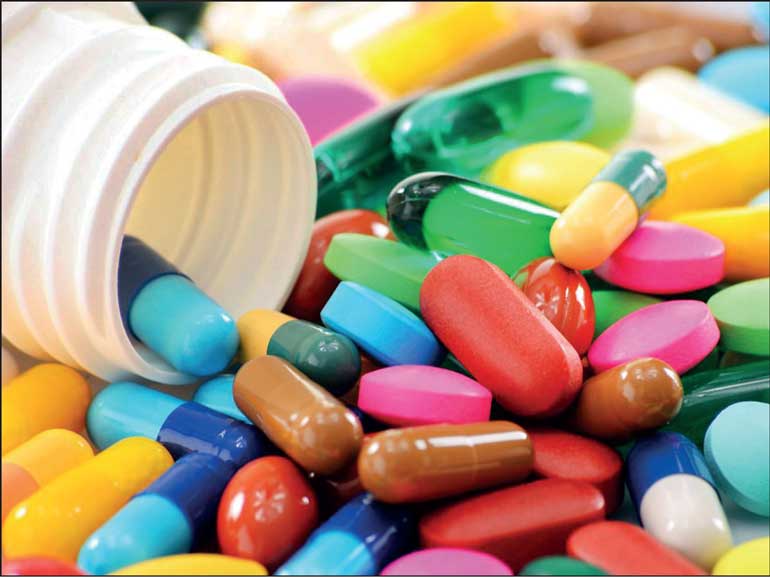Friday Feb 13, 2026
Friday Feb 13, 2026
Friday, 21 February 2025 00:22 - - {{hitsCtrl.values.hits}}

In most jurisdictions, generics are only burdened with showing that they
contain the same API, as opposed to proving their effectiveness in patients
 Ever bought a pair of ‘abibas’ slides from Pettah? Or some ‘Colvin Klean’ underwear? No harm if you have (reputational harm doesn’t count). But how safe would you feel buying the abibas version of a heart medicine?
Ever bought a pair of ‘abibas’ slides from Pettah? Or some ‘Colvin Klean’ underwear? No harm if you have (reputational harm doesn’t count). But how safe would you feel buying the abibas version of a heart medicine?
They appear the same, and objectively fulfil the same function – they’re just manufactured in unregulated conditions at a fraction of the cost. So, are they truly identical? This is the fundamental question when it comes to generic medicines versus brand-name drugs.
Generic drugs are essentially copies of brand-name medications, produced after the original patent expires. They are expected to contain the same active pharmaceutical ingredient (‘API’), meaning they should, in theory, work the same way. They are also much cheaper because their manufacturers don’t bear the cost of research, development, and marketing.
However, a drug isn’t just its API. It includes a blend of excipients – the binding agents, fillers, and coatings that affect how the medicine dissolves, absorbs, and interacts with the body. Think of it like a phone: yes, the basic functions may be the same, but the operating system, battery life, camera quality and functionality will greatly differ and affect the efficacy of the product.
The good, the bad and the uncertain
On paper, generics seem like the perfect alternative – cheaper, yet effective. They have made medicine more accessible to millions of people worldwide. Many countries, including Sri Lanka, encourage doctors to prescribe by generic name to reduce costs. In policy circles as well, affordability remains the primary argument for promoting generics over brand-name drugs – hence the proposal to compel doctors, by law, to only prescribe generics. The idea is simple – if paracetamol is paracetamol, why pay extra for ‘panadol’?
But reality is rarely that simple. All generics are not the same. Regulations require generics to be ‘bioequivalent’ to the original drug, meaning they must fall within a certain range of similarity. However, bioequivalence doesn’t guarantee therapeutic equivalence, or in layman’s terms, how the drug actually performs in the body. The United States Food and Drug Administration, for example, permits a 20% variation in the API concentration. While most generics stay within a much smaller margin, even a 4% difference can be significant for drugs with narrow therapeutic windows, i.e., heart medication or anti-seizure drugs.
Another problem is quality control. Countries like Sri Lanka depend heavily on imports, with more than 60% of our medicines coming from India, a country that is neither a part of the Pharmaceutical Inspection Co-operation Scheme (PIC/S), nor, meets World Health Organization (WHO) benchmarks regularly. The National Medicines Regulatory Authority (NMRA) of Sri Lanka, has been tasked with ensuring generics meet relevant safety standards. You may as well give them a nail clipper and ask them to mow the lawn – with only one accredited lab in the country, the workload is impossible to meet. As a result, substandard generics enter the market, putting patients at risk.
When cheaper comes at a cost
Imagine you find a leak in your house. Instead of using a durable sealant, you opt for a cheap quick-fix solution. On the surface, the problem seems resolved, but water slowly seeps through the cracks, accumulating behind the walls. Overtime, unnoticed moisture leads to structural damage, mould growth and costly repairs. What started as a minor, controllable issue escalates rapidly into an expensive catastrophe – all because the original fix was not up to standard.
Now, imagine we’re talking about your body and not your house.
The doctor prescribes you with a specific anti-cholesterol medication. The pharmacy hands you a generic, claiming it’s “what’s available now.” You, an individual who doesn’t know any better and relies on the advice of doctors and pharmacists, inquire if it’s the same thing, to which the pharmacist replies “yes.” Subsequently, you take the generic, but your cholesterol rises, and you feel unwell.
Just like the house, an improper fix may leave your body condemned as well.
There is also the issue of price-driven quality cuts. In Sri Lanka, the Government tenders prioritise the cheapest supplier. But cheaper doesn’t always mean better, does it? In fact, when has cheaper ever meant better? The lack of strong regulation means some generic manufacturers use lower-quality excipients, leading to reduced drug effectiveness. Worse, the presences of counterfeit and substandard medicines – estimated to be 20% of the Sri Lankan market – makes it difficult to trust what’s on the shelves.
Conclusion
Not all generics dissolve the same way, absorb at the same rate, or act as efficiently. In most jurisdictions, generics are only burdened with showing that they contain the same API, as opposed to proving their effectiveness in patients.
So, are all generics the same? No. While some are effective, others can be vastly different in how they work, how they are absorbed and how they affect the patient. A one-size-fits all approach to generics is dangerous. The right policy should balance affordability with rigorous quality checks to ensure that saving money doesn’t come at the cost of health or even worse, life.
(The writer is an attorney-at-law.)